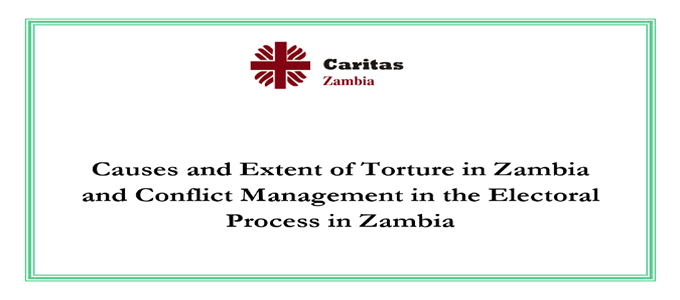Causes and Extent of Torture in Zambia and Conflict Management in the Electoral Process in Zambia
1.0. Introduction
Torture has been carried out and in some cases sanctioned by individuals, groups, and states throughout history from ancient times to the modern times. Forms of torture can vary greatly in duration from only a few minutes to several days or even longer. Reasons for torture can include punishment, revenge, political re - education , deterrence, interrogation or coercion of the victim or a third party, or simply the sadistic gratification of those carrying out or observing the torture.
The desire to torture a person is thought to be as a result of internal psychological pressure in the psyche of the torturer. The torturer may or may not intend to kill or injure the victim, but sometimes torture is deliberately fatal an d can precede a murder or serve as a cruel form of capital punishment . In other cases, the torturer may be indifferent to the condition of the victim.
Some forms of torture are designed to inflict psychological pain or leave as little physical injury or evidence as possible while achieving the same psychological devastation. Depending on the aim, even a form of torture that is intentionally fatal may be prolonged to all ow the victim to suffer as long as possible to the amusement of the torturer.
This presentation tries to identify some of the causes and extend of torture in Zambia . This paper also has a very short presentation of Conflict management in the Electoral Process in Zambia.
- The entire presentation can be found here: http://caritaszambia.org/index.php/publications/key-papers/file/78-caritas-zambia-presentation-to-parliamentary-committee-on-legal-affairs-governance-human-rights-gender-matters-and-child-affairs
- Also related is CARITAS Zambia's questions to the Minister of Justice over the proposed government road map on the Constitution Making Process which can be found here: http://caritaszambia.org/index.php/publications/key-papers/file/76-caritas-zambia-questions-to-minister-of-justice-on-proposed-government-road-map-on-constitution-making-process
- Another Press Statement on Government's position on the Constitution Making Process made by the Monze Chapter of CARITAS Zambia can be found here: http://caritaszambia.org/index.php/publications/key-papers/file/77-monze-ccjp-statement-on-constitution-making-process


